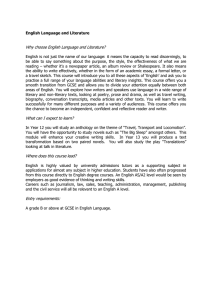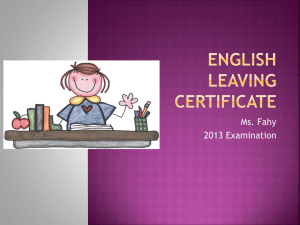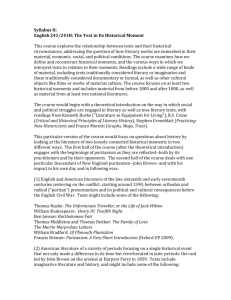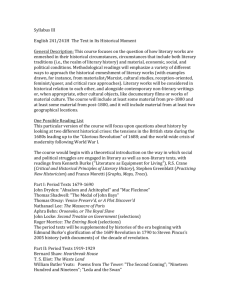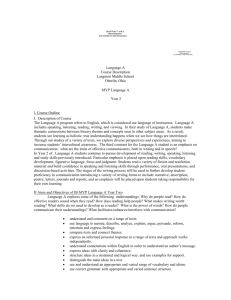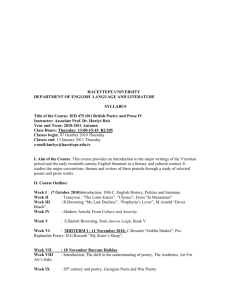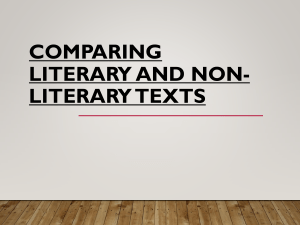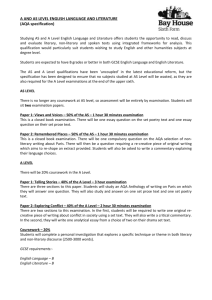the wonderful world of AS English Language and Literature
advertisement
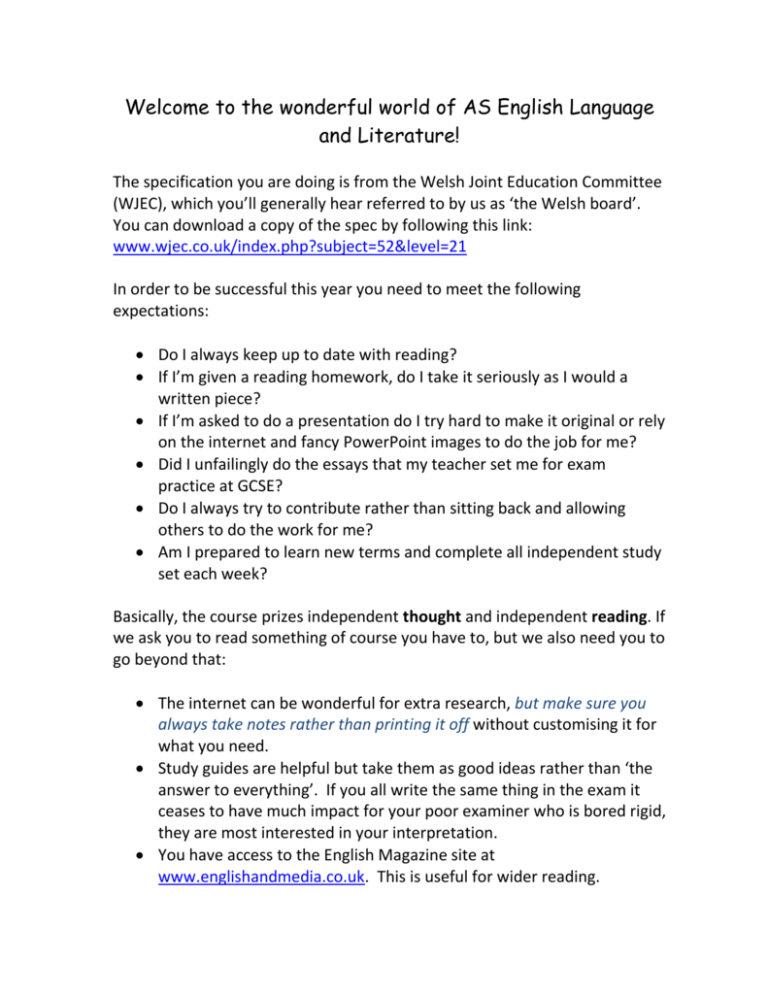
Welcome to the wonderful world of AS English Language and Literature! The specification you are doing is from the Welsh Joint Education Committee (WJEC), which you’ll generally hear referred to by us as ‘the Welsh board’. You can download a copy of the spec by following this link: www.wjec.co.uk/index.php?subject=52&level=21 In order to be successful this year you need to meet the following expectations: Do I always keep up to date with reading? If I’m given a reading homework, do I take it seriously as I would a written piece? If I’m asked to do a presentation do I try hard to make it original or rely on the internet and fancy PowerPoint images to do the job for me? Did I unfailingly do the essays that my teacher set me for exam practice at GCSE? Do I always try to contribute rather than sitting back and allowing others to do the work for me? Am I prepared to learn new terms and complete all independent study set each week? Basically, the course prizes independent thought and independent reading. If we ask you to read something of course you have to, but we also need you to go beyond that: The internet can be wonderful for extra research, but make sure you always take notes rather than printing it off without customising it for what you need. Study guides are helpful but take them as good ideas rather than ‘the answer to everything’. If you all write the same thing in the exam it ceases to have much impact for your poor examiner who is bored rigid, they are most interested in your interpretation. You have access to the English Magazine site at www.englishandmedia.co.uk. This is useful for wider reading. Go to the theatre as much as possible, not just when there is a school trip. The National Theatre has a scheme whereby you can go to any of their productions for £5 once you register. The Globe is only £10 if you stand up You are so fortunate to live in London which has so many art galleries and museums, and they are free. You are going to be studying writers whose work may be on display in its original form in the British Library. This years’ Lang/Lit class have had several exciting trips and enrichment opportunities. They met a Guardian editor and journalist and got to hear about her experience and routes into the profession. They visited Keats’ house and attended workshops with professional writers who have worked on Dr Who scripts and Berandine Evaristo. They also visited the British Museum for a guided tour and to see the evolving English exhibition. We often visit the V&A to gain inspiration for creative projects we are working on. There is a chance to run the school BBC Report team, if you are interested in journalism or getting some work experience mentoring younger students. There have been a recent film adaptation of Wuthering Heights released last year 2012 http://www.guardian.co.uk/film/2011/sep/06/wuthering-heightsreview another version was released in 2009, it is worth watching both in order to compare the production on each this will prepare you for your coursework in year 13. Also the BBC has run the Shakespeare season this year to celebrate the Cultural Olympiad, http://www.bbc.co.uk/arts/shakespeare. You will study King Lear in year 13 and Shakespeare’s poetry in year 12. We want to presume that you have done this course because you want to, rather than because you got good grades in English and couldn’t think of anything else to do, so don’t give us the wrong impression! Remember, this is a combined course – you need to be prepared to read a wide range of texts, both literary and non-literary and there’ll be a lot of new grammatical and linguistic terminology concepts to get your heads around. Finally, come and see us if you are unsure about anything. We want you to enjoy the course and get as much out of it as possible. So, having said all that, here’s the course information that you need: Unit 1- LL1 (The Exam) Critical Reading of Literary and Non-Literary Text 60% of AS, 30% of A level Section A: Poetry pre-1900 (closed text) + unseen text Choice of one from two questions (40 marks) You’ll study an anthology of poetry and we’ll look at a range of different texts to prepare you for the unseen text Section B: Prose (open text) 2 prose texts: choice of one from two questions (40 marks) EWS choice: Stella Gibbons Cold Comfort Farm and D H Lawrence Sons and Lovers Unit 2 – LL2 (Internal Assessment) Your coursework Creative Writing 40% of AS, 20% of A level 80 marks 3 tasks (80 marks: 2 x 20; 1 x 40) A folder of work of approximately 3000 words (roughly 3 x 1000) 1 literary piece of original writing 1 non-literary piece of original writing 1 commentary on both pieces of original writing The pieces must be ‘informed by wider reading’. Assessment Objectives (AOs) in order of weighting for AS AO3 Use integrated approaches to explore relationships between texts, analysing and evaluating the significance of contextual factors in their production and reception. (34%) AO1 Select and apply relevant concepts and approaches from integrated linguistic and literary study, using appropriate terminology and accurate, coherent written expression. (29%) AO4 Demonstrate expertise and creativity in using language appropriately for a variety of purposes and audiences, drawing on insights from linguistic and literary studies. (20%) AO2 Demonstrate detailed critical understanding in analysing the ways in which structure, form and language shape meanings in a range of spoken and written texts. (17%)

